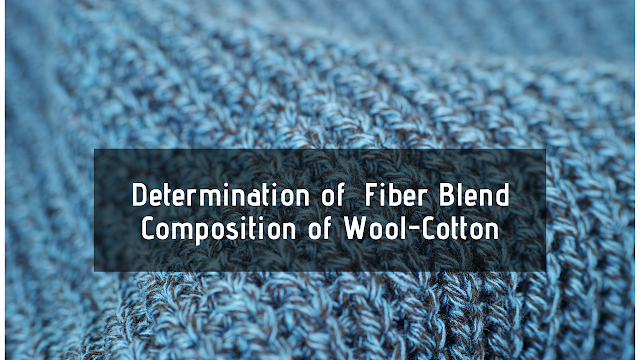Fiber Blend Composition of Wool-Cotton/Polyester/Nylon
Scope
This SOPS prescribes a method for quantitative chemical analysis of binary mixtures: in any textile form, such as fibres, yarn or fabric, of one protein fibres with certain non-protein fibres as follows:
Protein Fibres
- Wool
- Silk
- Mohair
- Cashmer
Non-Protein Fibres
- Cotton,
- Nylon (Polymide)
- Polyester
- Polypropylene
- Chloro Fibres
- Glass
Apparatus
- Drying Oven – For drying Sample (105 ± 3°C )
- Desiccator
- Analytical Balance – Capable of weighing an accuracy of 0.0002 g
- Conical Flask – 250 ml
- Sieve
Reagent
- 5 % Sodium Hydroxide (Naoh) or 5 % Potassium Hydroxide (KOH)
- 5 % Acetic Acid (m/m)
Procedure
- Sample weighing about 2.0 to 3.0 g. Cut the yarn into pieces and dissect the cloth into yarn pieces of about 10 mm length.
- Dry the sample in oven at 105 ± 3°C for 30 min.
- Cool in a Desiccator and weight them 1 gm sample (W)
- To the sample contained in the conical flask, add 100 ml of 5 % Naoh or 5 % KOH solution.
- Boil for 10 minutes
- After cool the solution, filter the content of the flask through a sieve
- wash the residue on the filter sieve with hot water, dilute Acetic (5 %) solution and finally cold distilled water.
- Dry the residue in the drying oven at 105 ± 3°C to constant weight,
- Cool in a desiccator and weight them (W1)
Calculation
Wool fibre (%) = 100 – W1*100 / W
Where
- W1 – Dry weight of residue
- W – Dry weight of sample
References – IS 2006 : Method for
quantitative chemical analysis of binary mixtures of protein fibres with
certain other non-protein fibres
quantitative chemical analysis of binary mixtures of protein fibres with
certain other non-protein fibres
